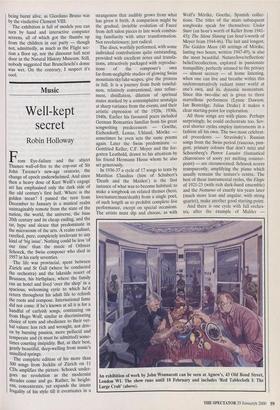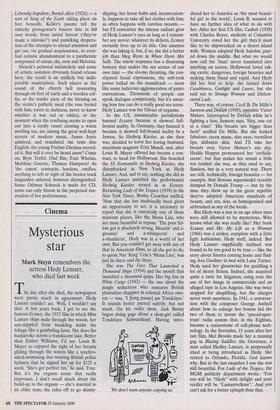Music
Well-kept secret
Robin Holloway
From Eye-failure and the abject Thames wall-of-fire to the cop-out of Sir John Tavener's new-age oratorio, the change of epoch underwhelmed. And since then a heavy dose of Kurt Weill's engage art has emphasised only the dark side of the old century's first half. Where is the golden mean? I passed the turn from December to January in a musical realm unimaginably remote from the state of the nation, the world, the universe, the base 20th century and its cheap ending, and the tat, hype and sleaze that predominate in the microcosm of the arts. A realm radiant, rarefied, pure, completely irrelevant to any kind of 'big issue'. Nothing could be less 'of our time' than the music of Othmar Schoeck, the Swiss composer who died in 1957 in his early seventies. The life was provincial, spent between Ziirich and St Gall (where he conducted the orchestra) and the lakeside resort of Brunnen, his birthplace, where the family ran an hotel and lived 'over the shop' in a Spacious, welcoming eyrie to which he'd return throughout his adult life to refresh the roots and compose. International fame did not come: if he's known at all it is for a handful of earlyish songs, continuing on from Hugo Wolf, similar in discriminating choice of texts and obedience to their ver- bal values: less rich and wrought, not driv- en by burning passion, more pellucid and temperate and (it must be admitted) some- times courting insipidity. But, at their best, gently beautiful, deep-welling from music's unsullied springs. The complete edition of his more than 300 songs from Jecklin of Ziirich on 11 CDs amplifies the picture. Schoeck under- goes no revolution as the modernist decades come and go. Rather, he height- ens, concentrates, yet expands the innate frugality of his style till it eventuates in a strangeness that audibly grows from what has given it birth. A comparison might be the gradual, invisible evolution of Faure from deft salon pieces to late work combin- ing familiarity with utter transformation. Not revolutionary; just radical.
The discs, worthily performed, with some individual contributions quite outstanding, provided with excellent notes and transla- tions, attractively packaged with reproduc- tions of the composer's own far-from-negligible studies of glowing Swiss mountain/sky/lake-scapes, give the process in full. It is a journey from fresh tuneful- ness, relatively conventional, into refine- ment, distillation, dilution of spiritual states marked by a contemplative nostalgia at sharp variance from the events, and their artistic expression of the 1920s, 1930s, 1940s. Earlier his favoured poets included German Romantics familiar from his great songwriting predecessors — Goethe, Eichendorff, Lenau, Uhland, Morike — sometimes he even sets the same poems again. Later the Swiss predominate — Gottfried Keller, C.F. Meyer and the for- gotten Leuthold, drawn to his attention by his friend Hermann Hesse whom he also set generously.
In 1936-37 a cycle of 17 songs to texts by Matthias Claudius (him of Schubert's 'Death and the Maiden') is the first instance of what was to become habitual; to make a songbook on related themes (here, love/nature/man/death) from a single poet, of such length as to prohibit complete live performance, except on special occasions. The artists must dip and choose, as with Wolf's Morike, Goethe, Spanish collec- tions. The titles of the main subsequent songbooks speak for themselves: Under Stars (an hour's worth of Keller from 1941- 43); The Silent Shining (an hour's-worth of Meyer from 1944-46). The last and longest, The Golden Mean (40 settings of Morike, lasting two hours, written 1947-49), is also the most beautiful. Nature/love/reflection/ belief/recollection, explored in passionate tranquillity, perfectly attuned to the privacy — almost secrecy — of home listening, when one can live and breathe within this undemonstratively radiant inner world at one's own, and its, dynamic momentum. Since this two-disc set is given to three marvellous performers (Lynne Dawson, Ian Bostridge, Julius Drake) it makes a clear starting-point for exploration.
All these songs are with piano. Perhaps surprisingly, he could orchestrate too. Sev- eral shorter cycles employ instruments in a fashion all his own. The two most celebrat- ed precedents — Stravinsky's Russian songs from the Swiss period (raucous, pun- gent, primary colours that don't mix) and Schoenberg's Pietrot Lunaire (fantastical chiaroscuro of sooty yet melting counter- point) — are circumvented. Schoeck scores transparently, amplifying the piano which usually remains the texture's centre. The best of these instrumental cycles, the Elegie of 1921-23 (with rich dark-hued ensemble) and the Nottumo of exactly ten years later (much more lean and angular, with string quartet), make another good starting-point.
And there is one cycle with full orches- tra, after the example of Mahler — Lebendig begraben; Buried Alive (1926) — a sort of Song of the Earth taking place six feet beneath. Keller's poems tell the unlucky protagonist's bizarre fate in hi§ own words, from initial horror ('they've made a mistake!') and panicking despera- tion of the attempts to attract attention and get out, via gradual acquiescence, to even- tual ecstatic abandonment to a pantheistic compound of ocean, sky, eros and Helvetia.
Shoeck's personal melancholy and sense of artistic isolation obviously found release here; the result is an unlikely but indis- putable masterpiece. Such places as the sound of the church bell resonating through six feet of earth and a wooden cof- fin, or the tender piety of the blessing on the victim's pathetic meal (the rose buried with him, eaten in darkness, never to know whether it was red or white), or the moment when the confining seems to open out into a lordly vessel cresting a warm swelling sea, are among the great well-kept secrets of modern music. James Joyce admired, and translated the texts into English: the young Fischer-Dieskau record- ed it. But will it ever be heard anew? Come on, Bryn Tend, Olaf Bar, Paul Whelan, Matthias Goerne, Thomas Hampson! As 'the canon' contracts, hardens, ossifies, anything to left or right of the beaten track languishes unloved, however distinguished. Some Othmar Schoeck is made for CD, some can only bloom in the perpetual ren- ovation of live performance.



















































































 Previous page
Previous page